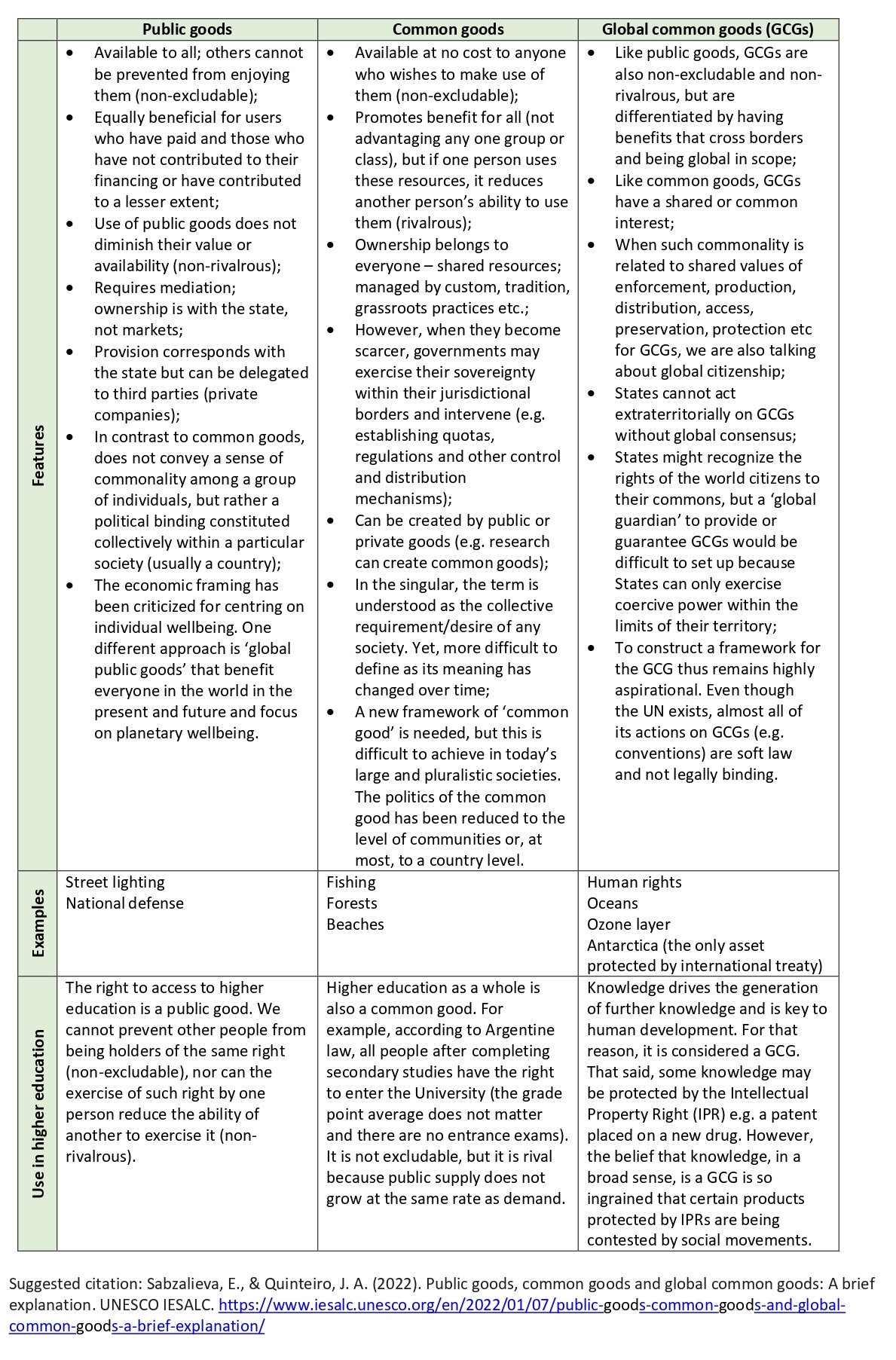Public goods, common goods and global common goods: a brief explanation

By Emma Sabzalieva and José Antonio Quinteiro | April 2022
Background: The notions of “public goods”, “common goods” and “global common goods” have often been used interchangeably. The boundaries of these concepts are blurred and imprecise, mainly because the language used to refer to them is highly connected with the ideological connotations within the prevailing political discourse of each time. This note sets out a brief explanation of these three concepts and explains how they have been applied by the United Nations/UNESCO.
Features and examples:

When the International Covenant on Economic, Social and Cultural Rights1 (1976) was signed, a more developmental approach prevailed in the world. This states that: “Higher education should be made equally accessible to all, on the basis of individual capacity, by every appropriate means, and in particular by the progressive introduction of free education” (Article 13, clause 2c). To this day, neither the right of access to higher education nor its cost-free nature has been institutionalized in most national laws. We can therefore think of this as morally but not legally enforceable. Application by United Nations/UNESCO
UNESCO IESALC’s vision is “to be an internationally recognized Institute for the promotion of higher education as a public good and a universal right, in keeping with the UN system of values.”2 At the First (19983) and even more so at the Second (20094) UNESCO World Higher Education Conferences (WHEC), higher education was discussed as a public good. The Second WHEC report says that the public good framing could be contentious if seen in economic terms because “after all, it is tradable and it does exclude. In fact, it has been noted that quality in higher education is, in fact, often demonstrated by exclusion” (p.25). Responsibility for regulating and financing higher education lies with government but “that responsibility must be shared among all stakeholders” (p.25).
However, by the 2015 Rethinking Education report5, the argument was made that it would be useful to consider education and knowledge as global common goods in the context of a changing (privatizing) world to reaffirm the collective dimension of education as a shared responsibility. The 2021 Futures of Education report6 further develops this framing, stating that education must be strengthened as a public endeavour and a common good. This is one of two foundational principles for the new envisaged social contract for education. It is explained as:
“As a shared societal endeavour, education builds common purposes and enables individuals and communities to flourish together. A new social contract for education must not only ensure public funding for education, but also include a society-wide commitment to include everyone in public discussions about education. This emphasis on participation is what strengthens education as a common good – a form of shared well-being that is chosen and achieved together.” (p.2)
Overall, it remains the current vision that higher education must be treated both as a public good and a common good.7 The renewed global commitment envisaged in the Education 2030 agenda and the bold statements in the Futures of Education report represent an opportunity to rethink educational governance and revisit the role of the state in the financing, regulation, and provision of higher education. Higher education must be reaffirmed as a common good as it promotes the development of instruments of participatory democracy and places greater emphasis on networks of solidarity among citizens and groups to overcome the utilitarian and individualistic approaches that the commercialization of higher education has brought in the last decades.
____
1 https://www.ohchr.org/en/professionalinterest/pages/cescr.aspx
2 https://www.iesalc.unesco.org/en/mission/
3 https://unesdoc.unesco.org/ark:/48223/pf0000141952.locale=en
4 https://unesdoc.unesco.org/ark:/48223/pf0000189242.locale=en
5 https://unevoc.unesco.org/e-forum/RethinkingEducation.pdf
6 https://unesdoc.unesco.org/ark:/48223/pf0000379707.locale=en
7 https://unesdoc.unesco.org/ark:/48223/pf0000261614/PDF/261614eng.pdf.multi
Picture of Baim Hanif on Unsplash
RELATED ITEMS








